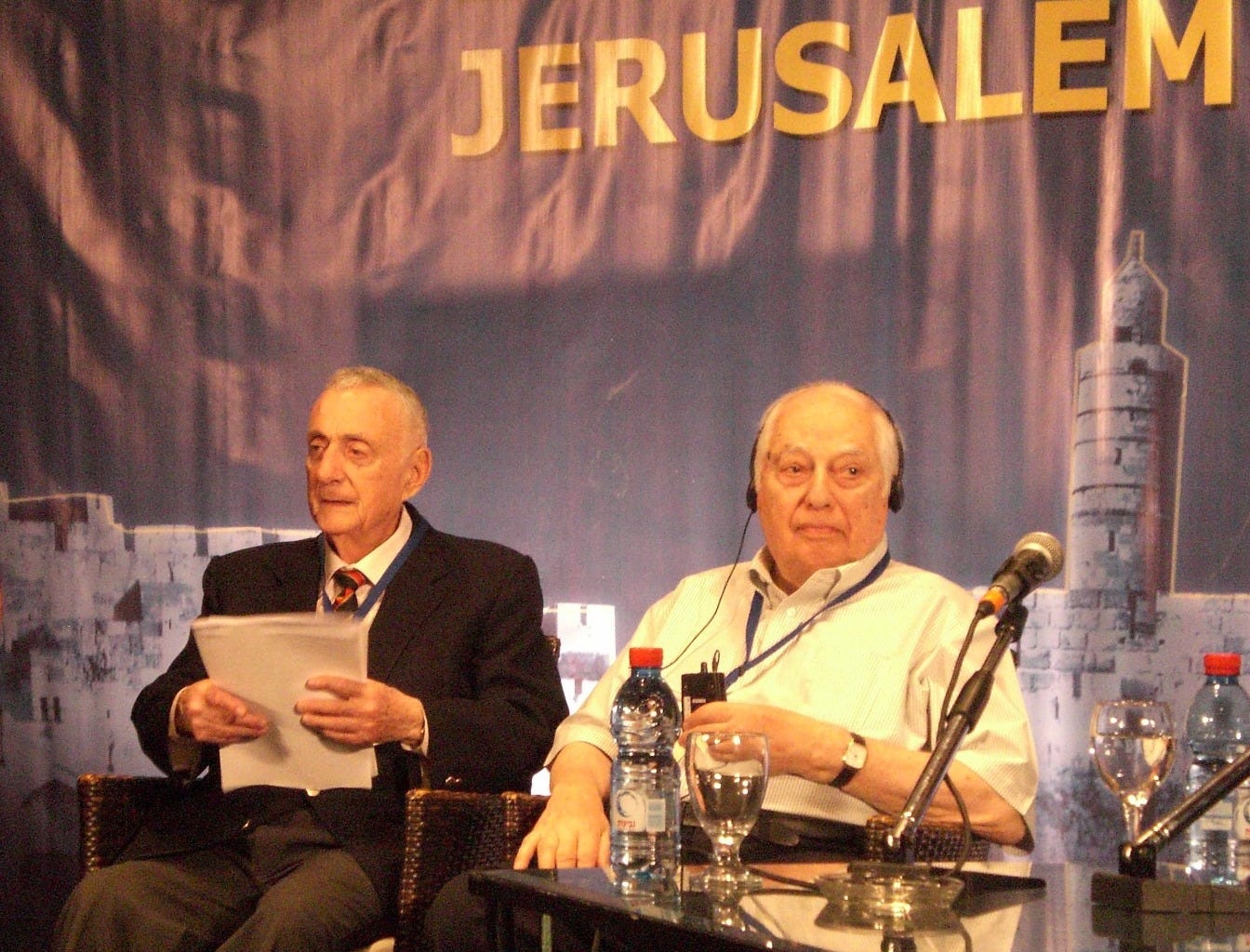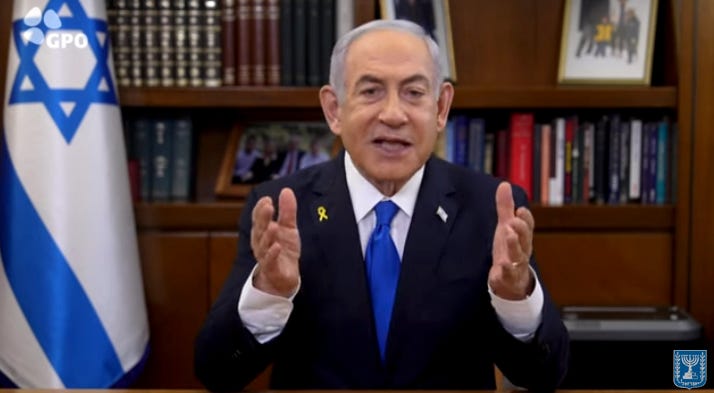How Can Israel and the U.S. Keep Lebanon Peaceful?
The main issue is Iran, as Uri Lubrani would have understood
The urgent challenge Israel and America face after Israel’s killing of the head of Hezbollah, Hassan Nasrallah, is to avoid allowing a victory to deteriorate into a defeat.
Sustaining a success would be a welcome departure from the recent American pattern.
In December of 2003, U.S. forces in Iraq captured Saddam Hussein. At the time it seemed like a landmark victory, and in some ways it was, but in the years since Iraq has seen a resurgence of terrorist groups such as the Islamic State, Kataib Hezbollah, Harakat Hezbollah al-Nujaba, and Hashd al-Shaabi, that are hostile to America, to Israel, and to peace and human dignity.
In 2016, U.S. forces killed the leader of the Taliban, Mullah Akhtar Mansour. That seemed like a big win, too, but in 2021 Afghanistan fell to Taliban control with a chaotic and deadly American retreat from Kabul.
How to prevent Lebanon from going the way of Iraq and Afghanistan?
The person who would give the wisest, best-informed answer is Uri Lubrani, who served for many years as Israel’s coordinator for Lebanon. Alas, he’s not available for interviews; he died in 2018 at age 91.
So I called instead the man who introduced me to Lubrani, Harold Rhode, who served from 1982 to 2010 at the U.S. Defense Department. Rhode was probably closer to Lubrani over the years, and for the longest time, than anyone in the U.S. government. I asked Rhode how Lubrani would answer.
Rhode replied by saying that communicating with the dead is not among the services he provides. He went on, though, to offer some useful context, reminding me that Lubrani’s file for the Israeli government was really not only Lebanon but also Iran, where Lubrani served as Israel’s ambassador before the 1979 Iranian revolution.
Israel’s wars and America’s in the Middle East take place alongside and within the war between Sunni and Shiite muslims that began in 632 with the death of Mohammad.
Iranians and southern Lebanese are both largely Shiite muslims, unlike the Palestinian Arabs, who are overwhelmingly Sunni. When Israel invaded Lebanon in 1982, the Shiites welcomed them, anticipating help in throwing off the Palestinian Sunnis who had moved in. Unfortunately, in the decades since, Tehran and its extreme ideology have dominated the Lebanese Shiites and turned them against Israel and the West.
In other words, Lebanon and Iran are tightly intertwined. The bridge between them runs through Syria, where the Iranian government, in partnership with Syria’s Alawi dictator Bashar al Assad, has been pushing out Sunnis. It also runs through Iraq, where Iran has gained remarkable influence.
What might an end-game scenario for Iran and Lebanon look like to flesh out the “blessing” option of the “blessing” or “curse” dichotomy that Prime Minister Neyanyahu posed in his United Nations speech?
In Lebanon, the Shiites south of the Alawi River might be relocated to formerly Sunni Syrian cities such as Homs. Houses there are waiting, abandoned by millions of Sunnis who have, since 2011, fled Syria for Turkey, Jordan, and beyond. So long as the Iranian regime remains in power, Israel would prefer to have Druze and Maronite Christians in southern Lebanon. A Maronite restoration in Lebanon—which prospered under the presidencies of Camille Chamoun (1952 – 1958) and Fouad Chehab (1958-1964)—could also address a concern Senator JD Vance has raised, that American foreign policy should care about ancient Christian communities. Some of the estimated seven million Brazilians of Lebanese descent, mostly Maronites, might even choose to make their way back, or accept Lebanese citizenship and voting privileges.
As for the regime change in Iran, Netanyahu made an explicit call for it in his U.N. speech: “Nations of the world should support the brave people of Iran who want to rid themselves of this evil regime.” That goes beyond what has typically been Israel’s public position, which is that Iran should cease its support for terrorism and its pursuit of nuclear weapons.
Netanyahu sharpened the message even further today, addressing the people of Iran directly. “Iran’s tyrants don’t care about your future,” Netanyahu said. “When Iran is finally free and that moment will come a lot sooner than people think – everything will be different. Our two ancient peoples, the Jewish people and the Persian people, will finally be at peace. Our two countries, Israel and Iran, will be at peace.”
“When that day comes, the terror network that the regime built in five continents will be bankrupt, dismantled. Iran will thrive as never before. Global investment. Massive tourism. Brilliant technological innovation based on the tremendous talents that exists inside Iran. Doesn’t that sound better than endless poverty, repression and war?” Netanyahu said.
The idea is starting to percolate into Israeli society.
The founder and chairman of Israel’s Defense and Security Forum, Brigadier General (Reserve) Amir Avivi, said that in a few weeks, Israel’s Air Force would be mostly done in the north and the south, and can focus on the east, targeting Yemen and Iran. “The world will be astonished at what capabilities Israel will have against Iran,” Avivi said.
Avivi urged America to join the fight. “If the U.S. joins now, this can be an historical moment with a huge, huge change,” Avivi said.
Avivi said there was an opportunity not only with Iran but with Lebanon.
“This is the first time that all of the people of Israel understand that we are on our way to victory,” Avivi said. “We need to push Hezbollah out of southern Lebanon.”
“The Lebanese people are getting an historic opportunity to get rid of Hezbollah,” Avivi said. “Maybe we will have peace with Lebanon.”
One prominent centrist Israeli public intellectual, Micah Goodman, spoke recently about various ways to look at Israel’s current war. You can see it, he said, as part of the long-running Israeli-Palestinian conflict, or as part of a new U.S.-China Cold War, or as part of a war between Israel and Iran. Goodman, no Netanyahu partisan, preferred the Israel-Iran war framing. When he shared the ideas on September 8 at a large Conservative synagogue in a liberal suburb of Boston, he met a friendly reception.
At least some influential Americans understand this. “The main issue between Lebanon and Israel is Iran,” President Trump’s son-in-law and Abraham Accords negotiator, Jared Kushner, wrote in a social media post. “The right move now for America would be to tell Israel to finish the job.” Vice President Harris, in contrast, reacted to Nasrallah’s death with a statement that, while mouthing support for “Israel’s right to defend itself against Iran and Iran-backed terrorist groups such as Hezbollah, Hamas, and the Houthis,” went on to call for diplomacy and de-escalation.
The biblical book of Daniel concludes with obscure prophecies of the angels Gabriel and Michael assisting in the defeat of Persia. Even Daniel finds the stories puzzling and asks (12:8), “what will be the outcome of these things?”
The answer he gets (12:10) is, “Many will be purified and purged and refined; the wicked will act wickedly and none of the wicked will understand; but the knowledgeable will understand.”
Without Lubrani’s presence, such an understanding is more difficult. But by necessity, and at long last, at least some influential people are figuring things out.





Stoll writes: "In December of 2003, U.S. forces in Iraq captured Saddam Hussein. At the time it seemed like a landmark victory, and in some ways it was, but in the years since Iraq has seen a resurgence of terrorist groups. … In 2016, U.S. forces killed the leader of the Taliban …. That seemed like a big win, too, but in 2021 Afghanistan fell to Taliban control with a chaotic and deadly American retreat from Kabul."
I detect a pattern here.